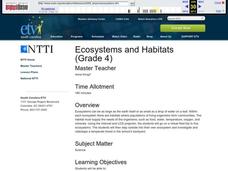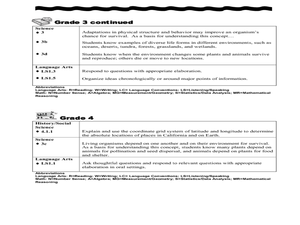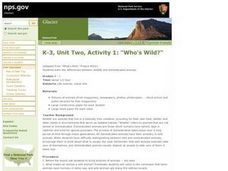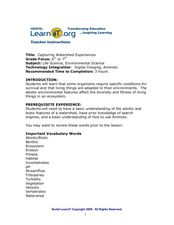Curated OER
Managing Wildlife
Students explore the relationship between wildlife and humans in northern New England. They also brainstorm ideas on why they think some species are greater in population than others in a given area.
Curated OER
What's Wild
Third graders discover the differences between wild and domestic animals. In this animal lesson, 3rd graders chart the differences in the animals and look through magazines for pictures of wild and domestic animals to glue to a poster....
Curated OER
Pharaoh Mountain Hike: Investigating Adirondack Life Zones
Students hike a local mountain and examine its life zones. They measure various components at each zone and collect leaf litter at the sites. At the mountain top, students make descriptive observations and complete a handout about the...
Curated OER
National Marine Sanctuaries Fish
Information is provided on Gray's Reef, Florida Keys, and Flower Garden Banks marine sanctuaries. Young marine biologists then visit the FishBase and REEF databases to collect fish species information for each location. They then...
Project Noah
Writing Goes Wild
Young scientists develop their observation and writing skills as they craft and then post a detailed description of a plant or animal they have spotted and photographed.
Curated OER
2nd Grade - Act. 25: Creature Creation
Create a creature using some of the characteristics of a real animal. Second graders will read a book from the "Froggy," series by Johnathan London to learn about the characteristics of frogs. After discussing and recording various...
Curated OER
The Environment
Students explore the issues that influence our environment and research ways to decrease the negative impact that humans have on the environment. Misconceptions about environmental issues are addressed in this lesson.
Forest Foundation
Fire - How Does it Relate to You?
Forest fires can be a necessary step in keeping a forest healthy, but what happens when they get out of control? Learners investigate the causes and effects of forest fires in two specific areas, culminating in a report about the ways...
ARKive
Temperate Rainforest in the Pacific Northwest
Explore the amazing temperate rainforest of the Pacific Northwest. Your class starts by investigating the animals and plants of the Northwest, specifically Washington, and then research an animal population common to the area. In small...
Curated OER
Parts of a Plant
Students explore biology by listening to an in-class lecture. In this plant science lesson, students sing songs with their classmates regarding anatomical parts of a plant and create plants from arts and crafts materials. Students listen...
Curated OER
The Conscription Crises
Learners explore roles played by Canada's prime ministers The Right Honorable Sir Wilfrid Laurier and The Right Honorable iam Lyon Mackenzie King with regards to the conscription crises of World War I and World War II.
Curated OER
Ecosystems and Habitats
Fourth graders go on a virtual field trip to five ecosystems. They investigate and videotape a temperate forest in the school's backyard.
Curated OER
"Julie of the Wolves"
Fifth graders research life in Alaska and compare life there to their lives in this lesson. They read "Julie of the Wolves." They research through the novel and other reference books facts about the Alaskan climate and geography. They...
Curated OER
VERTEBRATES
Seventh graders describe the main characteristics of warm-blooded vertebrate animals. They compare and contrast the two different groups of warm-blooded vertebrate animals by looking at external, reproductive, and growth characteristics.
Curated OER
Earth Pockets
Students identify the Earth's natural resources. In this Earth science lesson, students read the book The Great Kapok Tree and discuss types of natural resources. Students use categories such as wood, paper, and trees and list items that...
Curated OER
Because of Winn Dixie: Water Management Practices
Fourth graders read the book Because of Winn Dixie and define the characters, setting, and plot. In this Winn Dixie lesson plan, 4th graders also identify quality water management techniques addressed in the story.
Curated OER
The Life Cycle of the Butterfly
Second graders study the life cycle of a butterfly by observing metamorphosis taking place in a butterfly pavilion. Students illustrate their understandings of the body parts of a caterpillar and butterfly, as well as the life cycle,...
Curated OER
Louisiana Cinquains
Young scholars enhance their understanding of parts of speech by writing a cinquain poem about Louisiana. In this cinquain poem lesson, students read example cinquain poems and study the format for a cinquain poem. Young scholars create...
Curated OER
How Are Plants Similar And Different?
Studetns create an index card database of different categories of plants such as bushes, trees, flowers, grasses and vegetables. They review the different parts of a plant and label pictures of plants on the database cards. They use the...
Curated OER
Who's Wild?
Students explore the differences between animals of the wild and domesticated animals. In this wild animals lesson, students understand that tame animals ancestors were once wild. Students illustrate the differences by drawing a wild...
Curated OER
Sing! Sing a Song!
Students investigate climate change. They read and listen to an environmental song or a song about change or taking action. Students write, sing, and record their own song about climate change.
Curated OER
Hermit Crabs in the Classroom
Young scholars interact with hermit crabs in the their classroom. In this hermit crab lesson, students handle and observe hermit crabs while learning about their habitats and how to treat animals. They watch how the animals move and...
Curated OER
Changing Climate, Changing Animals
Young scholars review teacher-provided background materials on impact of climate change. Students then work in small groups to make poster on possible impacts of climate change on one particular northern animal, and how it might affect...
Curated OER
Capturing Watershed Experiences
Students observe organisms found in the water. In this lesson on organisms, students collect water from local streams and tributaries in order to study the organisms found in the water. As a culminating activity, students create a...

























